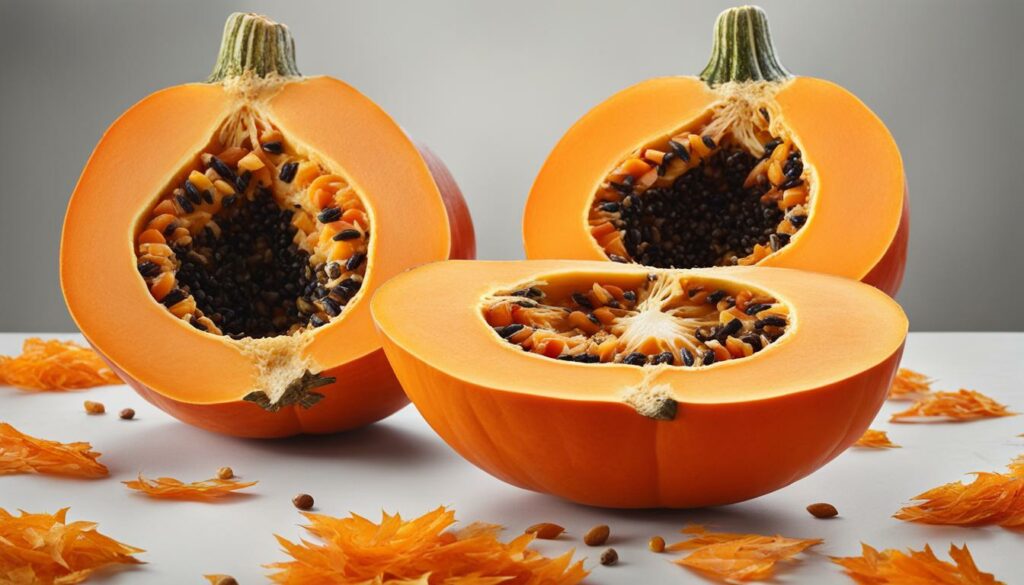Winter squash is a versatile and nutritious vegetable that offers a wide range of health benefits. As a popular winter vegetable, winter squash not only adds vibrant colors to your plate but also provides essential nutrients that promote overall well-being.
When it comes to nutrition, winter squash is packed with vitamins, minerals, and antioxidants. These nutrients play a crucial role in supporting various aspects of your health, including immune system function, eye health, heart health, and weight management.
By incorporating winter squash into your diet, you can enjoy a delicious and nutritious addition to your meals while reaping the numerous health benefits it offers.
Key Takeaways:
- Winter squash is a nutritious and versatile vegetable that offers a wide range of health benefits.
- It is rich in vitamins, minerals, and antioxidants that promote immune system function.
- Winter squash supports eye health, heart health, and weight management.
- Including winter squash in your diet can enhance your overall well-being.
- Try incorporating different types of winter squash into your fall and winter meal plans for maximum health benefits.
Types of Winter Squash and Their Benefits
Winter squash comes in a variety of types, each with its own unique benefits. Let’s explore the characteristics and advantages of some popular varieties.
Acorn Squash
Acorn squash is not only delicious but also packed with health benefits. It is rich in antioxidants, which help protect the body against harmful free radicals. Additionally, acorn squash contains a high amount of vitamins C and A, promoting a strong immune system and improving overall organ health.
Butternut Squash
Butternut squash is a favorite among many due to its sweet taste and velvety texture. Beyond its culinary appeal, butternut squash offers remarkable health benefits. It is high in fiber, supporting healthy digestion and aiding in weight management. Moreover, butternut squash is a great source of beta-carotene, which is crucial for maintaining proper eye health.
Spaghetti Squash
If you’re looking for a healthy pasta alternative, look no further than spaghetti squash. This unique variety contains low calories and offers an excellent source of vitamins B6, A, and C. These vitamins contribute to dental health and overall well-being.
Pumpkin
Pumpkin isn’t just for carving or making delicious pies; it’s also a nutritional powerhouse. Rich in vitamins, antioxidants, and beta-carotene, pumpkin provides numerous health benefits. The antioxidants in pumpkin help strengthen the immune system, while its high beta-carotene content supports eye health.
Now, let’s dive deeper into the nutritional value of winter squash and discover the vitamins, minerals, and fiber it offers.
The Nutritional Value of Winter Squash
Winter squash is a nutrient-dense vegetable that provides a wide array of vitamins, minerals, and fiber, making it a valuable addition to a balanced diet. Let’s explore the nutritional benefits of including winter squash in your meals:
Vitamins in Winter Squash
- Vitamin A: Winter squash is rich in beta-carotene, which converts to vitamin A in the body. Vitamin A is vital for immune function, vision, and maintaining healthy skin.
- Vitamin C: Winter squash contains a significant amount of vitamin C, an antioxidant that boosts immunity, supports collagen production, and aids in wound healing.
- Vitamin B6: Winter squash is a good source of vitamin B6, which plays a crucial role in energy metabolism, brain development, and the production of neurotransmitters.
Minerals in Winter Squash
- Potassium: Winter squash supplies a generous amount of potassium, an essential mineral that helps maintain healthy blood pressure levels, supports proper muscle function, and promotes heart health.
- Magnesium: Winter squash is also a good source of magnesium, which contributes to bone health, muscle function, and energy production.
- Iron: Winter squash contains iron, an essential mineral that is involved in oxygen transport, red blood cell production, and overall energy levels.
Fiber in Winter Squash
In addition to its vitamins and minerals, winter squash is rich in dietary fiber. Fiber aids in digestion, promotes bowel regularity, and helps control hunger by providing a feeling of fullness. Including winter squash in your diet can support digestive health and contribute to weight management.
To summarize, winter squash is a nutritional powerhouse, delivering essential vitamins, minerals, and fiber. Incorporating this versatile vegetable into your meals can enhance your overall health and well-being.

Winter Squash and Immune System Health
Winter squash is not only a delicious and versatile vegetable, but it also offers numerous immune-boosting benefits. This winter vegetable is packed with antioxidants that play a crucial role in strengthening the immune system and protecting the body against oxidative stress.
Antioxidants, such as vitamins A and C, are abundant in winter squash and are essential for overall immune health. Vitamin A helps regulate immune responses and supports the development of immune cells, while vitamin C enhances the production of antibodies and boosts the activity of immune cells.
By neutralizing harmful free radicals, antioxidants in winter squash help reduce inflammation in the body, which is crucial for maintaining a healthy immune system. Chronic inflammation can weaken the immune response, making the body more susceptible to infections and illnesses.
Including winter squash in your diet can help combat inflammation and optimize immune function.
Moreover, the rich array of antioxidants in winter squash helps protect the immune system from the damaging effects of oxidative stress. Oxidative stress occurs when there is an imbalance between free radicals and antioxidants in the body, leading to cell damage and a weakened immune system.
By incorporating antioxidant-rich winter squash into your meals, you can provide vital support to your immune system and promote overall well-being.
So, make sure to savor the flavors of winter squash this season and give your immune system the extra boost it needs!
“Winter squash is a natural immune booster, thanks to its high antioxidant content. Including winter squash in your diet can help protect against illnesses and promote optimal immune health.”
Winter Squash and Eye Health
When it comes to promoting eye health, winter squash, particularly varieties like butternut squash and pumpkin, are highly beneficial. These vegetables are packed with beta-carotene, a powerful antioxidant that plays a crucial role in maintaining good vision.
Beta-carotene, found in abundance in winter squash, is a precursor to vitamin A, which is essential for the health of our eyes. This important nutrient protects the eyes by acting as an antioxidant, neutralizing harmful free radicals, and preventing oxidative damage.
By doing so, beta-carotene helps prevent macular degeneration and other eye-related conditions.
To reap the benefits of winter squash for eye health, consider incorporating it into your diet regularly. Whether roasted, pureed, or added to soups and stews, winter squash can be a delicious addition to your meals.

| Benefits of Winter Squash for Eyes |
|---|
| Rich in beta-carotene, a precursor to vitamin A |
| Acts as an antioxidant to protect the eyes |
| Helps prevent macular degeneration |
| Supports overall eye health and vision |
Winter Squash and Heart Health
When it comes to heart health, winter squash offers numerous benefits that can help you maintain a healthy cardiovascular system. One of the key nutrients found in winter squash is potassium, which plays a crucial role in regulating blood pressure and maintaining proper heart function.
Potassium works in opposition to sodium, helping to reduce the risk of hypertension, a condition that can lead to heart disease. By including winter squash in your diet, you can support a healthy heart and reduce the chances of developing cardiovascular issues.
Winter squash is not only a delicious addition to your meals but also a heart-healthy choice. Its potassium content helps in blood pressure management, ensuring that your heart can function optimally. So, consider adding winter squash to your diet to support a healthy heart.
Conclusion
Winter squash is a nutritional powerhouse, offering a wide array of health benefits that can enhance your overall well-being. Packed with vitamins, minerals, and antioxidants, this versatile vegetable is a must-have in your fall and winter meal plans.
The health benefits of winter squash are remarkable. It supports your immune system, thanks to its rich antioxidant content. These antioxidants, such as vitamins A and C, help strengthen your immune system and defend against oxidative stress.
Winter squash also plays a vital role in maintaining eye health. The beta-carotene found in varieties like butternut squash and pumpkin promotes healthy vision and helps prevent eye-related conditions like macular degeneration.
In addition, winter squash contributes to heart health by providing essential nutrients like potassium. Potassium helps regulate blood pressure and supports proper cardiovascular function, reducing the risk of heart diseases.
Moreover, winter squash can aid in weight management due to its high fiber content. The fiber helps you feel full for longer, reducing hunger cravings and supporting a healthy body weight.
Incorporating winter squash into your diet is a delicious way to reap these health benefits and improve your overall wellness. So, be sure to include different types of squash in your fall and winter recipes for a nutritious and satisfying meal.
FAQ
What are the health benefits of winter squash?
Winter squash offers a wide range of health benefits, including improving immune function, supporting heart health, aiding in weight management, and promoting eye health.
What are the types of winter squash and their benefits?
There are several types of winter squash, including acorn squash, butternut squash, spaghetti squash, and pumpkin. Acorn squash is rich in antioxidants and promotes immunity and organ health. Butternut squash is high in fiber and beta-carotene, supporting weight management and eye health.
Spaghetti squash is a low-calorie substitute for pasta and provides vitamins B6, A, and C for dental health and well-being. Pumpkin is a nutritional powerhouse, packed with vitamins, antioxidants, and beta-carotene that boost immunity and promote eye health.
What is the nutritional value of winter squash?
Winter squash is a nutrient-dense vegetable, rich in vitamins and minerals. It contains high levels of vitamins A, C, and B6, essential for immune function, collagen production, and energy metabolism.
Winter squash is also a good source of minerals like potassium, magnesium, and iron, which support heart health, muscle function, and red blood cell production. Additionally, winter squash is high in dietary fiber, promoting digestive health and aiding in weight management.
How does winter squash affect the immune system?
Winter squash is a natural immune booster due to its high antioxidant content. Antioxidants, such as vitamins A and C found in winter squash, help protect the body from oxidative stress, strengthen the immune system, and neutralize free radicals.
Including winter squash in your diet can help protect against illnesses and promote optimal immune health.
How does winter squash support eye health?
Winter squash, particularly varieties like butternut squash and pumpkin, are excellent for promoting eye health. They are rich in beta-carotene, a precursor to vitamin A that is essential for good vision.
Beta-carotene acts as an antioxidant and helps prevent macular degeneration and other eye-related conditions. Including winter squash in your diet can support healthy eyes and maintain optimal vision.
How does winter squash benefit heart health?
Winter squash offers numerous benefits for heart health. It contains potassium, a key nutrient that helps regulate blood pressure and maintain proper cardiovascular function. Potassium works in opposition to sodium, reducing the risk of hypertension. By including winter squash in your diet, you can support a healthy heart and reduce the risk of heart disease.
What are the health benefits of winter squash?
Winter squash offers a wide range of health benefits, including improving immune function, supporting heart health, aiding in weight management, promoting eye health, and providing essential vitamins, minerals, and antioxidants for overall well-being.




